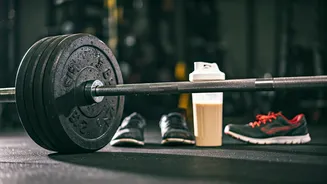Ignoring Post-Workout Nutrition
One of the most frequent errors individuals commit after exercising is neglecting post-workout nutrition. The body urgently needs nutrients after physical
activity to restore energy stores and repair muscle tissues. Failing to provide these essential building blocks can significantly slow down recovery and even lead to muscle breakdown rather than growth. A prompt intake of protein and carbohydrates is vital. Protein aids in muscle repair, while carbohydrates replenish glycogen reserves used during the workout. This crucial combination jumpstarts the recovery process, making sure that your body quickly gets back on track to becoming stronger and fitter. Delayed or inadequate nutrition essentially renders much of the preceding effort in the gym less effective.
Skipping Cool-Down Routines
Many fitness enthusiasts mistakenly rush through or completely bypass the cool-down phase after an intense workout. Cool-down activities, which include light cardio and stretching, play a vital role in preventing muscle soreness and speeding up recovery. These practices allow the heart rate to gradually return to normal, preventing sudden changes that could lead to dizziness or injury. Additionally, stretching improves flexibility, and reduces the likelihood of muscle cramps. By not properly cooling down, individuals risk increasing the amount of time required for muscle repair and potentially setting themselves up for injuries. Therefore, a proper cool-down is just as important as the workout itself, aiding in overall well-being and reducing potential harm.
Insufficient Hydration Levels
Dehydration is a common problem for people post-workout, and it can significantly undermine any fitness progress. The body loses fluids through sweat during exercise, and these must be promptly replaced. Not drinking enough water can lead to muscle cramps, fatigue, and slower recovery times. Water is essential for numerous bodily functions, including nutrient transport and waste removal. Without proper hydration, the body struggles to function at its best, hindering both muscle repair and growth. Furthermore, it impacts energy levels and overall performance. Therefore, drinking water before, during, and after workouts helps to ensure the body's optimal function, allowing you to maximize gains and feel better overall.
Overtraining Without Rest
Continuous training without allowing the body to rest and recover is another major impediment to making fitness gains. Pushing yourself too hard, without taking days off, can lead to overtraining syndrome. This condition is characterized by chronic fatigue, decreased performance, and an increased risk of injury. The body repairs and builds muscle during periods of rest, not during exercise. Repeatedly working out without rest taxes the muscles and the nervous system, which in turn reduces the body's ability to adapt and grow stronger. Incorporating rest days and varying the intensity of workouts are crucial for allowing the body to recover, preventing injuries, and ultimately making better progress towards fitness goals. This balance enables effective and long-lasting results.
Poor Sleep Quality
Sleep is a critical yet often overlooked factor in fitness recovery. During sleep, the body releases growth hormones and repairs muscles. Insufficient or poor-quality sleep can hinder this process, slowing down muscle growth and increasing the likelihood of setbacks. Lack of sleep impacts several important aspects of physical and mental health. It can reduce energy levels, slow metabolism, and impair cognitive function. For fitness enthusiasts, this means slower recovery times, increased muscle soreness, and a greater risk of injury. Aiming for 7-9 hours of quality sleep each night allows the body to fully recover and prepare for future workouts. Prioritizing good sleep hygiene ensures better performance and progress toward fitness goals.
Excessive Alcohol Consumption
Consuming alcohol after a workout is another habit that undermines progress. Alcohol can interfere with the muscle recovery process and can impair the synthesis of proteins. This can lead to decreased muscle growth and a slower return to a healthy state. Furthermore, alcohol is dehydrating, which compounds the effects of fluid loss from exercise. It can also disrupt sleep, further reducing the body’s ability to recover. While the occasional drink might not completely derail efforts, frequent or excessive alcohol consumption can negate the benefits of a workout. For best results, moderation is key. Avoiding or minimizing alcohol consumption after workouts is advisable for those dedicated to maximizing muscle gains and overall fitness.
Ignoring Muscle Soreness
Finally, ignoring or attempting to work through muscle soreness is a common mistake that can impede fitness progress and potentially lead to injuries. While some soreness after exercise is normal, pushing through excessive pain can worsen muscle damage and extend recovery times. It is essential to listen to the body and allow time for healing. Instead of continuing intense workouts, consider taking rest days or engaging in light activities like walking or gentle stretching. This helps the body to recover properly, reducing the risk of injuries and allowing muscle tissues to repair themselves. If soreness is severe, consulting a professional can help to identify any underlying issues and adjust the training accordingly. Addressing muscle soreness is essential for long-term health and consistent progress.












